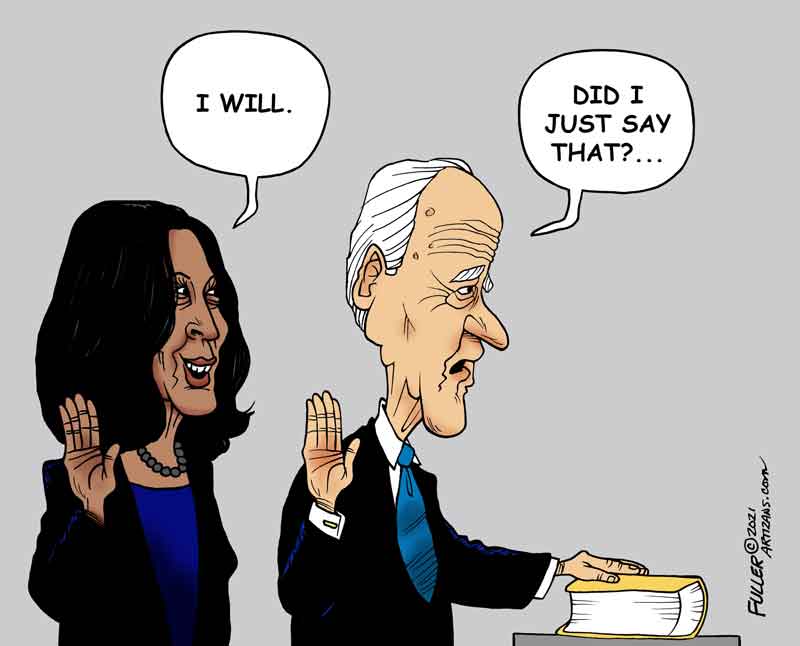
Most obviously, she will be running alongside the most elderly presidential nominee in American history. At age 82 by the time of the next inauguration, Joe Biden’s incapacity or death could conceivably place the bumbling Vice President in the White House. It is hardly outrageous or unthinkable to argue that those who back a Biden Presidency are simultaneously endorsing the real possibility of a Harris presidency before Biden’s next term comes to its scheduled close when he’s 86 years old.
Secondly, Harris’s role in the upcoming campaign will take on special importance because the Republicans mean to focus on it. Polling shows that during her more than two years in office, the Vice President has drawn even weaker support than her boss; a recent Wall Street Journal survey showed only 35% of likely voters expressing approval of the job she’s done for the nation. For the GOP, targeted criticism of Kamala Harris works as a “two-fer”—simultaneously reminding the public of Biden’s vulnerability and infirmity at the same time that you emphasize the limitations and stumbles of the Vice President who might well succeed him.
In fact, Harris represents such a uniquely juicy target that Republican strategists should develop plans for heightening the attention she receives.
One way to do that would be to identify their own candidate for Vice President as soon as possible in order to compare and contrast the available choices for the second-highest post in the executive branch of government. Harris is already a sure bet as the Democratic nominee; Biden featured her prominently in his three-minute announcement video and his campaign team has left no doubt whatever that they mean to return her to the Naval Observatory, the official if anomalous home of all Vice Presidents. This situation gives her maximum exposure to Republican attacks and fault-finding, with more than 16 months before the GOP convenes their national convention in Milwaukee to make their own choice official.
But why should the Republicans wait that long before designating their replacement for the feeble Harris?
The battle for the presidential nomination is scheduled to reach its climax by March 5, 2024, with Super Tuesday, when a dozen states hold their primaries or caucuses, including such vote-rich battlefields as California, Texas, Virginia, Massachusetts, Minnesota and more. As in other competitive nomination fights in both parties over the last 40 years, the winner on Super Tuesday will very likely command enough momentum and delegates to lay claim to the nomination, whether that candidate turns out to be Donald Trump or one of his potential rivals.
For the front-runner to announce his Vice-Presidential choice in mid-March, some four months before the delegates actually assemble for their national convention, would not only provide more time for the new team to learn to work in collaboration but would also expand the opportunity to bring together the various factions in the cause of party unity.
An early announcement of a Republican Veep would also mean 16 extra weeks (at least) to turn that candidate loose in an all-out assault on Harris and her weaknesses, emphasizing the manifold advantages of the GOP selection. It’s easy to imagine who that contender could be, especially with pressure for the Republicans to recruit another, more formidable female to replace the first woman to hold a nationally elected office. Nikki Haley offers one obvious choice, as do Governors Kristi Noem of South Dakota or Kim Reynolds of Iowa, or Senator Joni Ernst of Iowa for that matter. The longer that Kamala Harris faces comparison to a new, credible and energetic rival, the more tired, dreary and exposed the incumbent would seem. It’s worth remembering that when Harris conducted her own campaign for President in 2020, she managed to shed rather than build support every week that she continued an embarrassing candidacy that yielded nothing — an absolute zero — in terms of delegate support.
Other prominent and esteemed Republicans have experimented with early running-mate designations, with limited success. In 1976, Ronald Reagan tried to inject last-minute new support for his robust nomination challenge to President Gerald Ford by announcing his choice of Richard Schweiker, moderate Republican Senator from Pennsylvania, as his running mate if he succeeded in winning the nomination. Reagan fell just short of victory, and when he did win the White House four years later, he selected Schweiker as his first Secretary of Health and Human Services.
On April 27, 2016, as the last serious contender hoping to block Donald Trump’s nomination by the Republican Party, Senator Ted Cruz announced that if he managed to beat the odds and became the nominee, he would select former candidate (and one-time corporate CEO) Carly Fiorina as his vice-presidential running mate. Six days later he lost the Indiana Primary and Senator Cruz suspended his campaign, making Fiorina’s candidacy the briefest in political history.
The idea of naming an early challenger to Kamala Harris bears no real similarity to these prior disappointments because this time that choice would come, ideally, only after the POTUS competition had been decided definitively, not as a desperate stunt to keep the contest open. The idea would be to target Harris as early and effectively as possible, by stressing the superiority of the Republican choice by every available measure. One can even imagine a pre-convention televised debate between the two designated candidates, a way to inject new energy and public interest in a race where both Trump and Biden — the two likely presidential contenders — have both expressed significant reluctance to participate in high-profile showdowns over the most important office.
In 2024, the advanced age of these aging aspirants makes the vice-presidential choice more consequential than ever before and an early selection by the ultimate GOP nominee would help to give that job the enhanced focus that it surely deserves.
Michael Medved, a member of USA Today's Board of Contributors, hosts a daily, syndicated talk radio show and is author, most recently, of "G od's Hand On America: Divine Providence in the Modern Era." (Buy it at a 55% discount! by clicking here or order in KINDLE edition at just $14.99 by clicking here. Sales help fund JWR.)


 Contact The Editor
Contact The Editor
 Articles By This Author
Articles By This Author